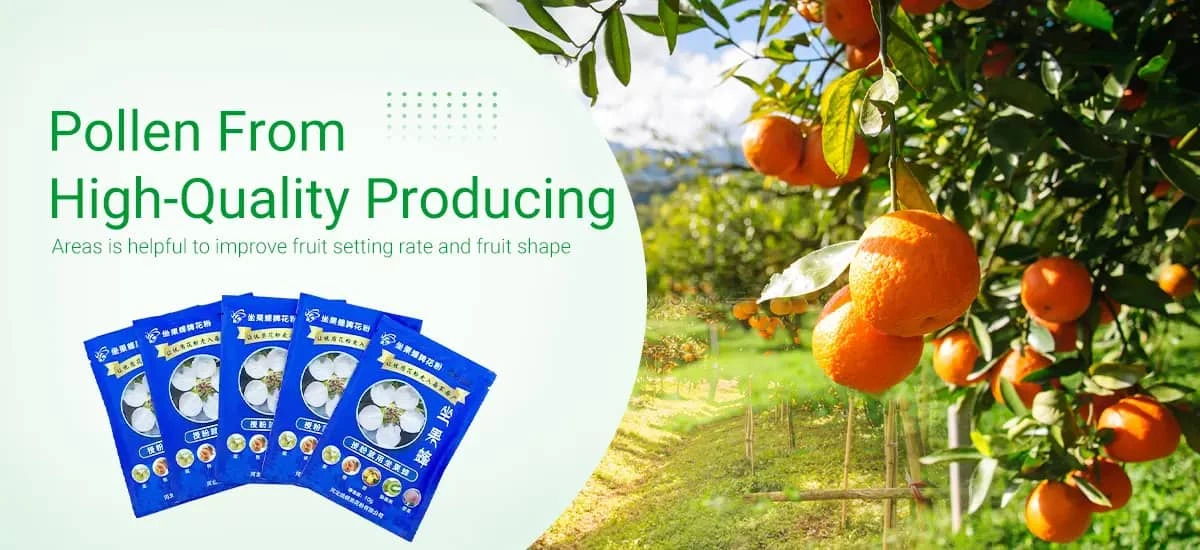Dec . 30, 2024 19:31 Back to list
pollen for pollination in cherry orchard products
The Importance of Pollen for Pollination in Cherry Orchard Production
Pollination is a critical process in the reproductive cycle of flowering plants, particularly fruit-bearing trees such as cherry (Prunus avium). The successful pollination of cherry blossoms directly influences fruit set, yield, and the overall quality of cherry production. One of the key elements that contribute to effective pollination is pollen, which plays a vital role in fertilizing the ovules within the flowers. In this article, we will explore the significance of pollen in the pollination of cherry orchards, the factors influencing pollen availability, and best practices for optimizing pollination and maximizing fruit production.
Cherry trees are predominantly insect-pollinated, with honeybees (Apis mellifera) being the primary pollinators. These diligent insects transfer pollen from the male anthers of one flower to the female stigma of another, allowing fertilization to occur. The chemical composition of pollen is intricate, containing proteins, lipids, and carbohydrates essential for the growth and development of the plant. When bees collect pollen, they inadvertently facilitate the cross-pollination necessary for cherry production, ensuring genetic diversity and improving fruit quality.
The amount and quality of pollen available to pollinators can significantly affect the success of pollination in cherry orchards. Factors such as climate, environmental conditions, and tree health all play crucial roles in determining pollen viability and abundance. Warmer temperatures during the blooming period can lead to earlier flowering, but if frost occurs, it can damage the blossoms before pollination can take place. Moreover, prolonged periods of wet weather can limit bee activity, reducing the efficiency of pollination.
Another aspect to consider is the importance of having compatible cherry varieties in proximity to ensure effective cross-pollination. Many cherry varieties are self-incompatible, meaning they cannot fertilize their own flowers and require pollen from a different variety for successful fruit set. Orchard managers should assess which cherry varieties grow best together and ensure they are planted within close proximity to enhance pollination rates.
pollen for pollination in cherry orchard products

To optimize pollen production and improve pollination success, orchardists can implement several best practices. First and foremost, maintaining a healthy ecosystem that supports diverse pollinator populations is essential. Growing a variety of plants that bloom at different times can attract and sustain pollinators throughout the growing season. Additionally, minimizing the use of pesticides, especially during the flowering period, can help protect beneficial insect populations, including bees, ensuring they remain available for pollination.
Another effective strategy is to introduce managed honeybee colonies into cherry orchards. Beekeepers can place hives strategically within orchards to increase local pollination efforts. Commercial pollination services can also provide growers with access to a significant number of honeybees during the critical pollination window, which can enhance fruit set and overall yield.
Timing is essential in orchard management, particularly concerning the flowering period of cherry trees. Regular monitoring of bloom stages can help growers synchronize their pollination efforts with peak bee activity. Understanding the relationship between environmental conditions and pollination can guide decisions about irrigation and other cultural practices.
In conclusion, pollen plays a fundamental role in the pollination of cherry orchards, directly impacting fruit yield and quality. By understanding the dynamics of pollen availability and bee behavior, orchard managers can implement effective strategies to create a conducive environment for pollination. Through careful management of compatible varieties, diverse planting, and protection of pollinator populations, cherry producers can significantly enhance their orchard productivity, leading to bountiful and high-quality cherry harvests.
-
Artificial Pollination: Boost Crop Yields Efficiently
NewsAug.27,2025
-
Premium Kiwipollen for Sale | Male Kiwi Pollen Supply
NewsAug.26,2025
-
High-Quality Apple Tree Pollen for Sale - Boost Your Harvest!
NewsAug.25,2025
-
Pure Plant Pollen: Optimize Pollination & Boost Yields
NewsAug.24,2025
-
Pure Plum Tree Pollen for Sale - Optimal Pollination
NewsAug.22,2025
-
Apple Tree Pollen for Sale: Boost Orchard Yields!
NewsAug.21,2025